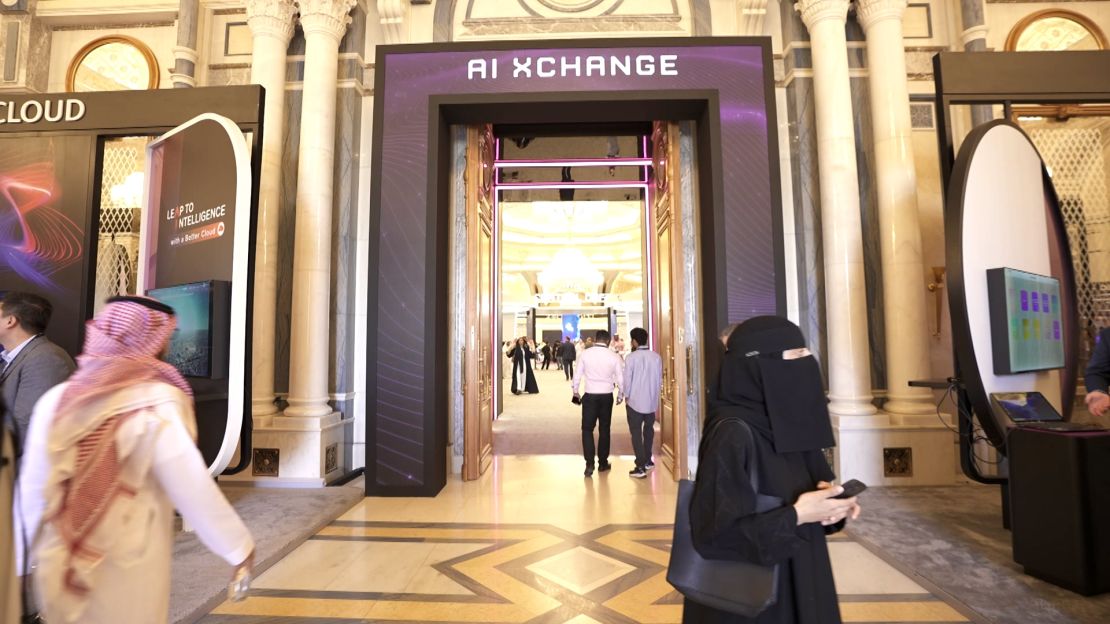CNN
–
In recent years, the United Arab Emirates (UAE) has shown that it wants to be one of the biggest in artificial intelligence, but now other countries in the Gulf really understand this technology.
AI could contribute $320 billion to the Middle East by 2030, about 2% of total global profits, according to a report from consultancy PwC. “There is a huge investment in (AI) in the Middle East,” said Stephen Anderson, Middle East strategist and market leader at PwC, speaking to CNN at last week’s Global AI Conference (GAIN) in Riyadh, Saudi Arabia. .
“Here in the region, people are more willing to experiment and engage with AI than in other parts of the world,” he added.
One issue with the rapid growth of AI is that it can be very energy intensive, and increasingly a major source of greenhouse gas emissions. Google reports that its 2023 emissions will be almost 50% more than in 2019, partly due to the energy demand of AI. Energy demand for AI, data centers and cryptocurrencies could double by 2026, according to the International Energy Agency.
But Anderson believes that the Gulf countries, whose economies are heavily dependent on fossil fuels, are well positioned to become “big players” in technology, and to be able to make it greener.
“We are at the center of the world when it comes to energy – not just old energy, but especially new energy,” he said. “This is the least expensive place anywhere in the world to produce solar energy. So the opportunity to combine sustainability with energy and the computing power required from an AI perspective is really important.
Anderson pointed to the UAE, Qatar and Saudi Arabia as the region’s leading AI investors.
As Saudi Arabia looks to reduce its dependence on oil and gas, it has invested heavily in AI, which it says will help achieve the goals set out in the “Vision 2030” strategy, a government program to diversify the economy. . According to a recent forecast from the Saudi Data and AI Agency (SDAIA), which hosted the GAIN summit, AI will contribute 12% of GDP by 2030, with the sector growing at an annual rate. of 29%.

There have been effective efforts across the region to develop Arabic language models trained on local databases that capture language content in a way that tools like ChatGPT do not. Last year, the UAE introduced a tool called Jais, and Saudi Arabia launched the ALLaM chatbot in Arabic.
Last week, it was announced that ALlaM will be hosted on Azure, Microsoft’s cloud computing platform. This follows the news earlier this year that it will also be available on IBM’s watsonx platform.
Nick Studer, CEO of management consulting firm Oliver Wyman Group, who attended the GAIN summit, said focusing on Arabic-language models could help Saudi Arabia compete with English-speaking markets that have “fa “low-cost” space because of the many major language formats available
According to Studer, there are more than half a dozen major language versions based on Arabic in the development of the country, focusing on different use cases, from stories to government and corporate applications. “The combination of public and private businesses could well lead to the development of an AI center, especially in the kingdom and the wider region that wants to diversify their economies,” he said.
One of the biggest challenges in the development of AI is public perception and governance: how can AI and data be regulated in a safe, secure, ethical and fair way?
During the conference, various policies were announced, including the unveiling of the SDAIA guidelines that deal with the responsibility of using deep fakes, the unveiling of the Riyadh Convention on AI in the Islamic World, which lays down a framework for its development AI technology in accordance with Islam. values and principles, and a global framework for AI readiness, led by the International Telecommunication Union.
Studer says that robust architecture is critical to the future of AI.
“There are many concerns with the development of AI – not only personal concerns, not only the risks of losing jobs, but also all the way to national independence if your economy starts to rely on devices built outside of your hands,” he said. “It is important that we have reasonable legislation.”
#Gulf #countries #superpowers #CNN